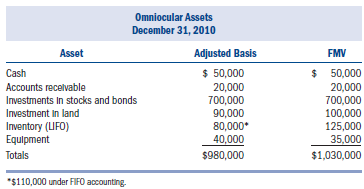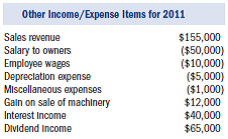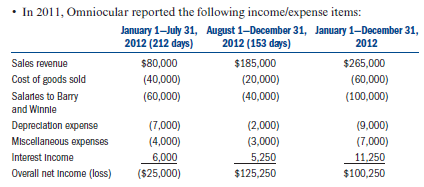
McGraw-Hill's Taxation of Business Entities 3rd Edition by Connie Weaver, Brian Spilker, Edmund Outslay, John Robinson, Ronald Worsham, Benjamin Ayers, John Barrick
Edition 3ISBN: 9780077924522
McGraw-Hill's Taxation of Business Entities 3rd Edition by Connie Weaver, Brian Spilker, Edmund Outslay, John Robinson, Ronald Worsham, Benjamin Ayers, John Barrick
Edition 3ISBN: 9780077924522 Exercise 20
Barry Potter and Winnie Weasley are considering making an Selection on March 1, 2011, for their C corporation, Omniocular. However, first they want to consider the implications of the following information:
• Winnie is a U.S. citizen and resident.
• Barry is a citizen of the United Kingdom, but a resident of the United States.
• Barry and Winnie each own 50 percent of the voting power in Omniocular.
However, Barry's stock provides him with a claim on 60 percent of the Omniocular assets in liquidation.
• Omniocular was formed under Arizona state law, but it plans on eventually conducting some business in Mexico.
a. Is Omniocular eligible to elect S corporation status If so, when is the election effective
For the remainder of the problem, assume Omniocular made a valid Selection effective January 1, 2011. Barry and Winnie each own 50 percent of the voting power and have equal claim on Omniocular's assets in liquidation. In addition, consider the following information:
• Omniocular reports on a calendar tax year.
• Omniocular's earnings and profits as of December 31, 2010, were $55,000.
• Omniocular's 2010 taxable income was $15,000.
• Omniocular's assets at the end of 2010 are as follows:

• On March 31, 2011, Omniocular sold the land for $42,000.
• In 2011, Omniocular sold all the inventory it had on hand at the beginning of the year. This was the only inventory it sold during the year.

• Assume that if Omniocular were a C corporation for 2011, its taxable income would have been $88,500.
b. How much LIFO recapture tax is Omniocular required to pay and when is it due
c. How much built-in gains tax, if any, is Omniocular required to pay
d. How much excess net passive income tax, if any, is Omniocular required to pay
e. Assume Barry's basis in his Omniocular stock was $40,000 on January 1,
2011. What is his stock basis on December 31, 2011
For the following questions, assume that after electing S corporation status Barry and Winnie had a change of heart and filed an election to terminate Omniocular's Selection, effective August 1, 2012.

f. For tax purposes, how would you recommend Barry and Winnie allocate income between the short S corporation year and the short C corporation year if they would like to minimize double taxation of Omnicular's income
g. Assume in part (f ) that Omnicular allocates income between the short S and C corporation years in a way that minimizes the double taxation of its income. If Barry's stock basis in his Omnicular stock on January 1, 2012, is $50,000, what is his stock basis on December 31, 2012
h. When is the earliest tax year in which Omniocular can be taxed as an S corporation again
• Winnie is a U.S. citizen and resident.
• Barry is a citizen of the United Kingdom, but a resident of the United States.
• Barry and Winnie each own 50 percent of the voting power in Omniocular.
However, Barry's stock provides him with a claim on 60 percent of the Omniocular assets in liquidation.
• Omniocular was formed under Arizona state law, but it plans on eventually conducting some business in Mexico.
a. Is Omniocular eligible to elect S corporation status If so, when is the election effective
For the remainder of the problem, assume Omniocular made a valid Selection effective January 1, 2011. Barry and Winnie each own 50 percent of the voting power and have equal claim on Omniocular's assets in liquidation. In addition, consider the following information:
• Omniocular reports on a calendar tax year.
• Omniocular's earnings and profits as of December 31, 2010, were $55,000.
• Omniocular's 2010 taxable income was $15,000.
• Omniocular's assets at the end of 2010 are as follows:

• On March 31, 2011, Omniocular sold the land for $42,000.
• In 2011, Omniocular sold all the inventory it had on hand at the beginning of the year. This was the only inventory it sold during the year.

• Assume that if Omniocular were a C corporation for 2011, its taxable income would have been $88,500.
b. How much LIFO recapture tax is Omniocular required to pay and when is it due
c. How much built-in gains tax, if any, is Omniocular required to pay
d. How much excess net passive income tax, if any, is Omniocular required to pay
e. Assume Barry's basis in his Omniocular stock was $40,000 on January 1,
2011. What is his stock basis on December 31, 2011
For the following questions, assume that after electing S corporation status Barry and Winnie had a change of heart and filed an election to terminate Omniocular's Selection, effective August 1, 2012.

f. For tax purposes, how would you recommend Barry and Winnie allocate income between the short S corporation year and the short C corporation year if they would like to minimize double taxation of Omnicular's income
g. Assume in part (f ) that Omnicular allocates income between the short S and C corporation years in a way that minimizes the double taxation of its income. If Barry's stock basis in his Omnicular stock on January 1, 2012, is $50,000, what is his stock basis on December 31, 2012
h. When is the earliest tax year in which Omniocular can be taxed as an S corporation again
Explanation
a)Is Omniocular eligible to elect S corp...
McGraw-Hill's Taxation of Business Entities 3rd Edition by Connie Weaver, Brian Spilker, Edmund Outslay, John Robinson, Ronald Worsham, Benjamin Ayers, John Barrick
Why don’t you like this exercise?
Other Minimum 8 character and maximum 255 character
Character 255


